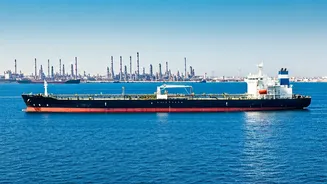Trade's Rising Tide
The trade of oil between India and Russia has been experiencing considerable growth. This surge in trade has brought with it a series of strategic considerations,
and economic advantages for both parties involved. This partnership provides a crucial energy supply for India, and creates an important market for Russia's oil exports. The dynamics of this trade are influenced by diverse factors, ranging from geopolitical alliances to price considerations, underlining the significance of this evolving partnership. The increase in trade has become a subject of great interest in international markets, demonstrating its influence on global energy structures and trade routes.
Factors at Play
Several factors contribute to the escalating oil trade between India and Russia. The discounted prices offered by Russia are an important driver, especially amid global price fluctuations. Geopolitical shifts and diplomatic relations between the two nations have further fostered this relationship. These factors have come together to form a beneficial trade environment, where each party is gaining from the other. The increased trade also underlines the efforts made by India and Russia to diversify their economic partnerships and ensure energy security amidst global uncertainties. These strategies have proven crucial in stabilizing their economies and cementing their standing in the international arena.
Economic Impact Explored
India's oil trade with Russia carries significant economic implications. The discounted oil prices benefit India's economy by lowering import costs and curbing inflation, which strengthens domestic financial stability. The increased trade also adds to India's energy security, protecting the nation from global market instability. Further, this trade opens avenues for investment and collaboration across various sectors, stimulating economic growth. The economic impacts are varied, contributing to India's strategic autonomy and building its position in the world markets. The advantages include economic resilience, and a solid base for India's continued growth trajectory in a complicated global environment.
Global Implications Noted
The growing oil trade between India and Russia has extensive repercussions on a global scale. It influences the dynamics of international energy markets, with significant consequences for worldwide trade flows and the price of oil. India's strategy to diversify its energy sources and reduce its reliance on traditional suppliers is changing the global balance of power. The trade's evolution is an important factor in diplomatic and strategic discussions, highlighting the complexity and interconnectedness of modern global economics. These shifts emphasize India's expanding role on the global stage, affecting geopolitics and international alliances.
Future Outlook Considered
The future of India's oil trade with Russia is subject to various projections. The enduring cooperation between India and Russia in the energy sector is likely to continue, although the trajectory of this partnership is influenced by factors such as global politics, pricing structures, and changes in the market. As India strives to ensure energy security and diversify its supply sources, the relationship with Russia will probably continue to evolve, with implications for international relations. This dynamic highlights the adaptability needed to navigate the ever-changing global energy landscape and India's position within it.





















